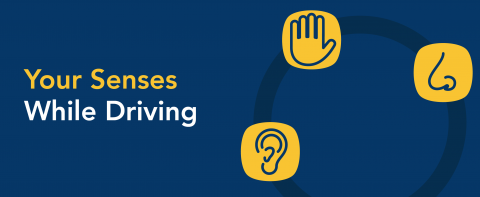Using Your Senses While Driving (Besides Vision)

A large majority of the information you gather while driving is received through your eyes, such as the cars around you, traffic lights and signals, road construction, street signs, and so much more. Even though your sense of sight is crucial, you will still need to depend on other senses to identify any potential dangers and to drive as safely as possible.
Hearing
Your sense of hearing can alert you to the sounds of vehicle horns, train whistles, emergency-vehicle sirens, and engines and braking of vehicles. You can also get early warning of mechanical problems by listening for unusual noises from your car. Do not turn up the music too loud in your car; you may miss these important warning signs.
Smell
Your sense of smell can identify an overheated engine or overheated brakes. Smelling exhaust fumes inside your vehicle can warn you of the presence of a dangerous issue. If you start to smell something unusual from your car, take it in to the nearest maintenance shop so that the issue can be resolved as soon as possible.
Touch
Your sense of touch may not seem like an obvious one, but it plays a role in your ability to drive safely. You should always drive with both hands touching the wheel to give you maximum stability and control. Placing both hands on the wheel can also help you sense mechanical issues such as a poorly balanced tire or a tire that is deflating.
Using all of your senses will ensure that you are staying focused on the road in order to get to your destination safely. All of your senses work together to give you clues as to what’s going on around you. If you ever feel that something isn’t right with your vehicle, don’t hesitate to get it checked out.